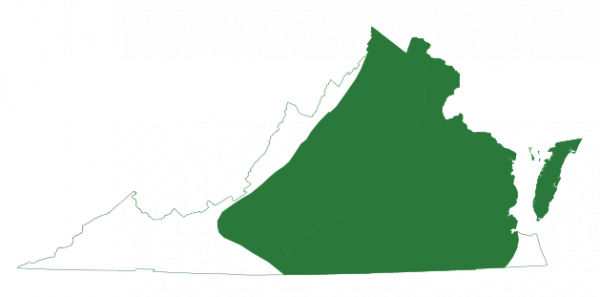Eastern_Spadefoot_3 © J.D. Kleopfer
Eastern_Spadefoot_2 © John Willson
Eastern_Spadefoot_4 © Steve Roble
Fact File
Scientific Name: Scaphiopus holbrookii
Classification: Amphibian
Conservation Status:
- Species of Greatest Conservation Need-Tier 4a on the Virginia Wildlife Action Plan
Size: Up to 3 inches
Life Span: These frogs live 12 years in captivity and on average 9 years in the wild
Identifying Characteristics
Spadefoots receive their name from a black spade-like appendage on each hind foot (middle right), which is used for burrowing into sand or loose soil. The large protruding eyes have vertically elliptical pupils. Usually brown, sometimes yellowish or quite dark, often mottled, with two light, yellowish, dorsal stripes extending from the eye down the back. They also have small paratoid glands and few warts.
Distribution:
Primarily found in the sandy soils of the Coastal Plain with scattered records in the Piedmont and Blue Ridge Mountains.

Did You Know?
Unlike the synchronous-leg swimming pattern typical of many species of frog, spadefoots have an asynchronous or alternate-leg kicking pattern.
Role in the Web of Life
Breeding can occur from early March-early August. Referred to as an “explosive breeder”, they usually remain buried underground only emerging from burrows after heavy rain events and may only remain at breeding site for 1 or 2 days, which includes flooded farm fields, grassy areas, and power-line right- of-ways. Their advertisement call is a complaining nasal descending growl, errrrrrrh that is repeated every 5-10 seconds.
Conservation
Tier IV Species of Greatest Conservation Need in Virginia’s Wildlife Action Plan
Last updated: August 14, 2024
The Virginia Department of Wildlife Resources Species Profile Database serves as a repository of information for Virginia’s fish and wildlife species. The database is managed and curated by the Wildlife Information and Environmental Services (WIES) program. Species profile data, distribution information, and photography is generated by the Virginia Department of Wildlife Resources, State and Federal agencies, Collection Permittees, and other trusted partners. This product is not suitable for legal, engineering, or surveying use. The Virginia Department of Wildlife Resources does not accept responsibility for any missing data, inaccuracies, or other errors which may exist. In accordance with the terms of service for this product, you agree to this disclaimer.

